Elastic Grid
Elastic Grid was an enterprise channel marketing platform used by global tech leaders including VMware, Atlassian, RedHat, and Google. It enabled vendors to provide their partners with ready-to-launch digital campaigns, complete with end-to-end lead tracking and ROI reporting. As Head of Product (2012–2017), I was responsible for the end-to-end customer experience—overseeing the platform’s UX/UI, visual identity, marketing, and support assets. My role was key in adapting the product to the evolving needs of channel marketers and their partners.
Employer: Elastic GridRole:CX Team Lead | Lead UX Designer

The opportunity
Elastic Digital was facing declining interest in its core creative agency model for IT channel marketers. Post-GFC budget constraints and a growing demand for speed-to-market put pressure on traditional campaign delivery methods, eroding margins. However, the company had already developed a foundational tool—The Grid—which enabled vendors to deliver co-branded campaigns to their Channel Partners.
This sparked a pivotal shift: reimagining the tool as a product. The result was Elastic Grid—a platform that moved beyond bespoke creative services to focus on scalable campaign delivery. The company repositioned around a central marketplace where Channel Partners could easily access and launch ready-made campaigns from multiple vendors. This shift demanded a unified, end-to-end customer experience across the entire platform.
The result
As Head of Product (2012–2017), I led the transformation of Elastic Grid from a service-based agency into a scalable SaaS platform. This repositioning—from campaign producer to strategic partner in channel demand generation—involved standardising features, redesigning the UX, and building in self-serve marketing automation tools.
The result was a platform that delivered measurable results for vendors and a streamlined experience for their partners. This product-led approach significantly boosted engagement and ROI visibility—ultimately positioning Elastic Grid as a valuable acquisition target. In 2017, it was acquired by Zift Solutions, who integrated its platform and services to enhance their global Channel-as-a-Service offering.
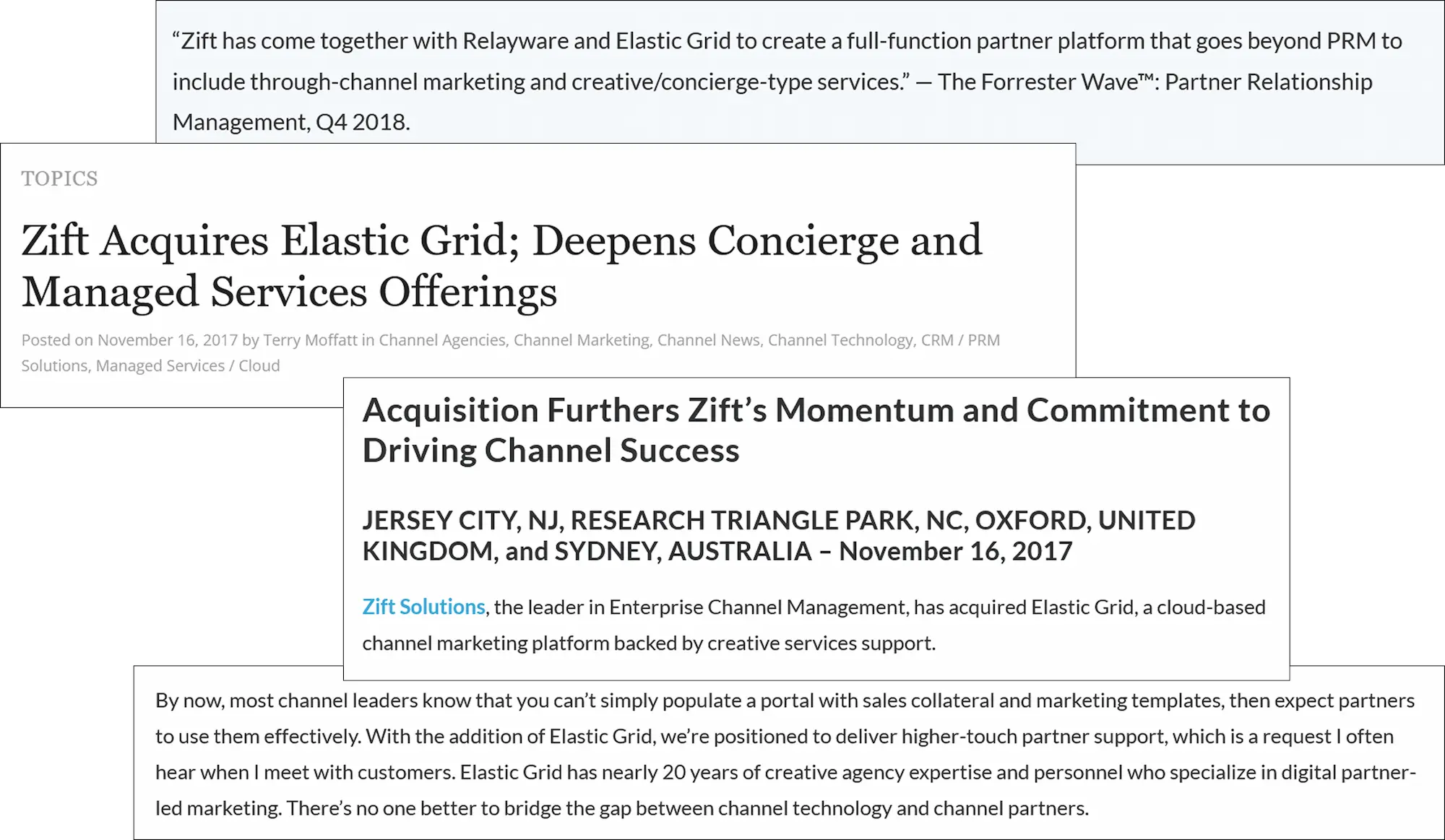
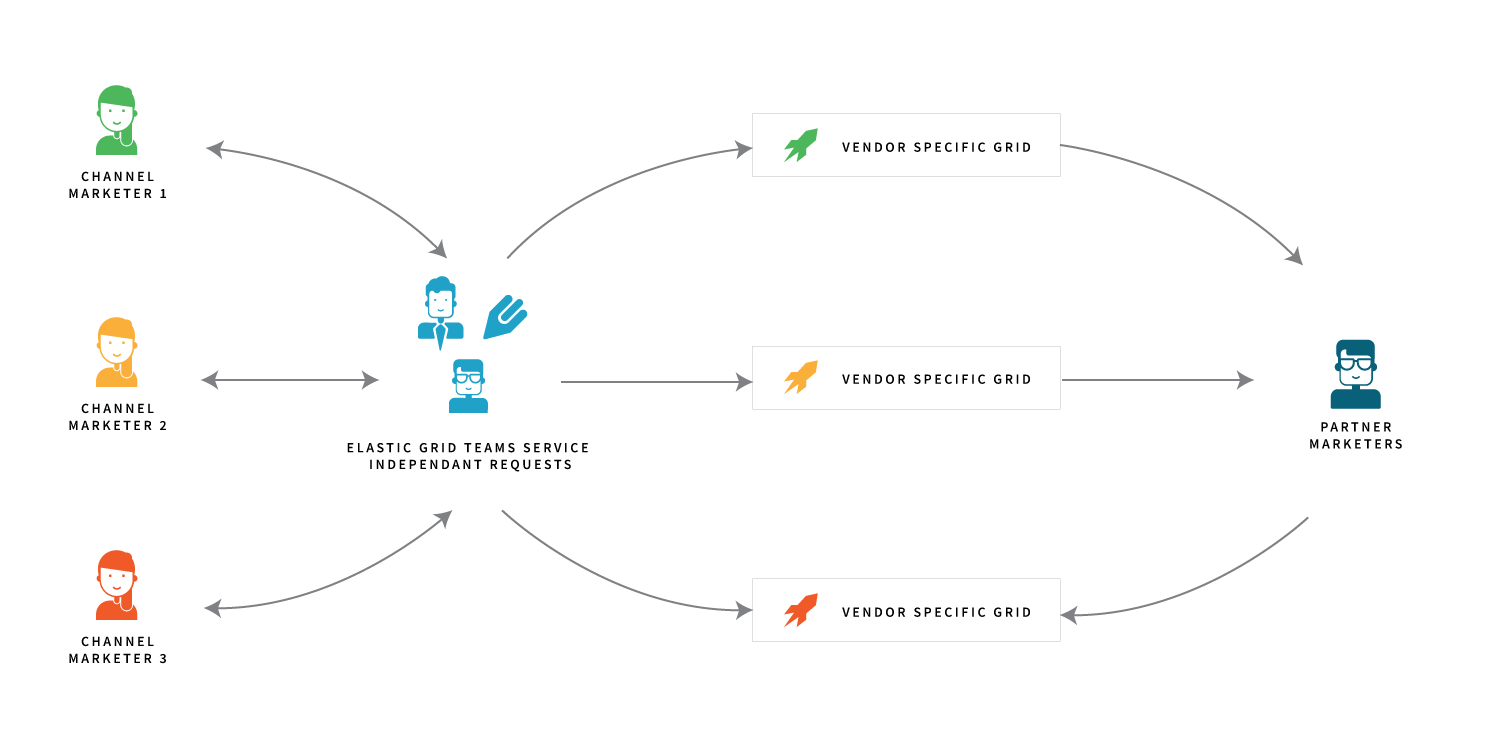
Reimagining the software
"The Grid" had traditionally been distributed by duplication. Based on the idea that Channel Partners were unique accross all Vendors, individual vendor "Grids" where built and bespoke change requests were serviced. This was not efficiant, nor scalable and the rigidity became a barrier to new features and ideas. Additionaly, many Channel Partners were utilising multiple campaigns across different Vendors. This created a less that ideal user experience for Channel Partners who managed campaigns across multiple platforms and logins.
Elastic Digital vendor Grids were rolled out one-by-one with endless duplication.
The fundamental change
"The Grid" needed to become a centralised application, open to all Channel Partners and 'Elastic' in nature. Elastic Grid would allow for a single Partner accounts to access all the Vendor campaigns and marketing assets they partnered with. This shift to a user-centric model, directed focus to improving the overall product for partners rather than constantly reacting to vendor requests.
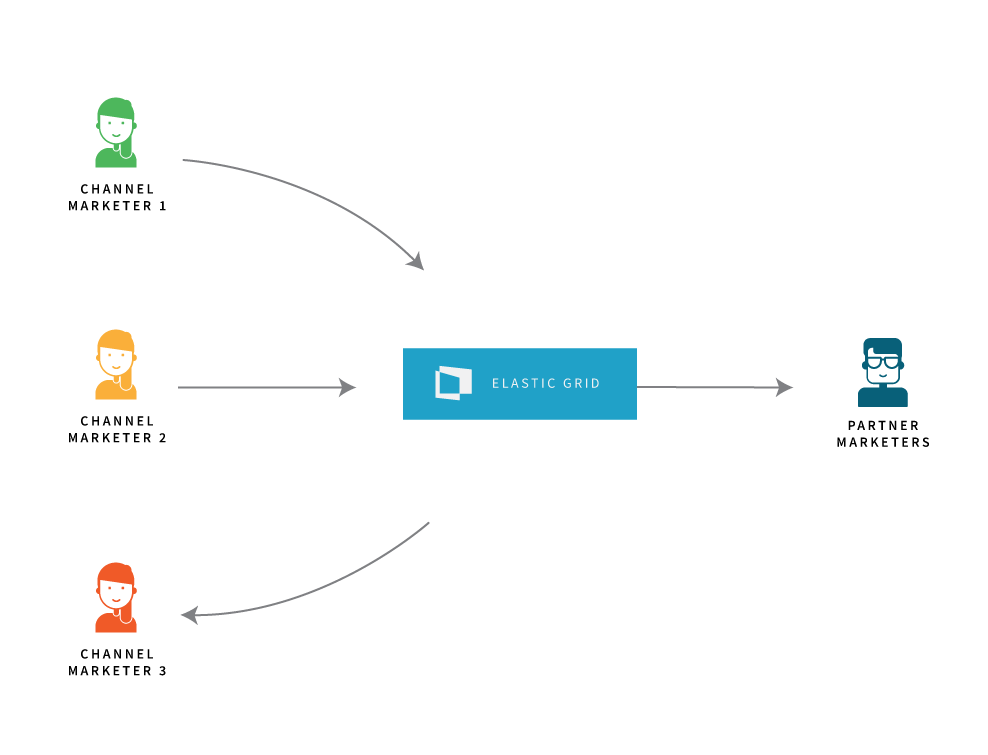
Elastic Grid focused its vendors on adding content to the platform and allowed partners to access it all in the one place
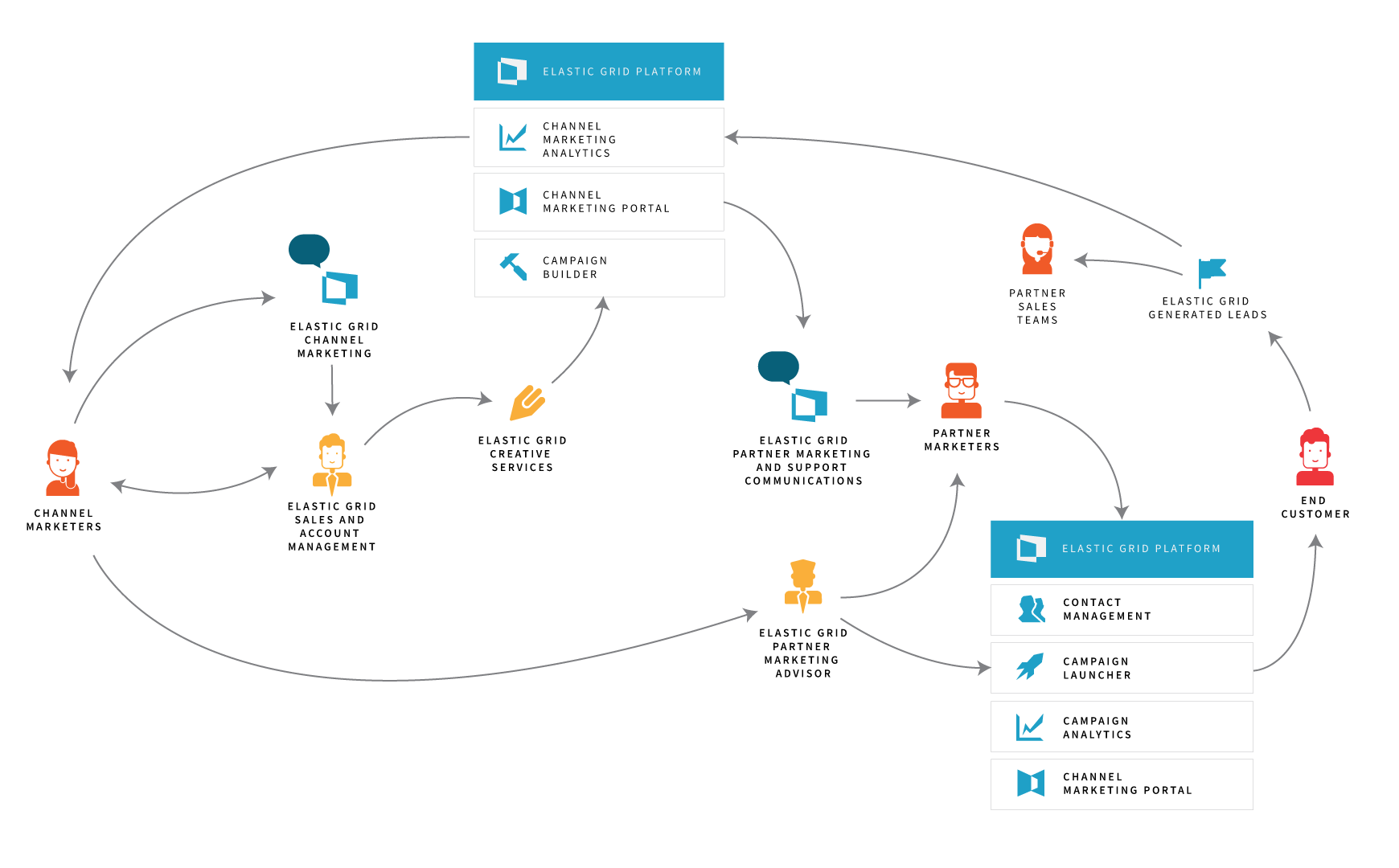
The new eco-system
The Elastic Grid eco-system become more cohesive; Vendor Channel Marketers managed their content rather than the platform. Their Partners (Re-Sellers) and their End Customers were managed centrally. The system began to acknowledge the needs of all players and benefited all of them by enabling Partners. The user-centred approach increased usage of the platform and provided more clarity about behaviours, which informed constant improvement.
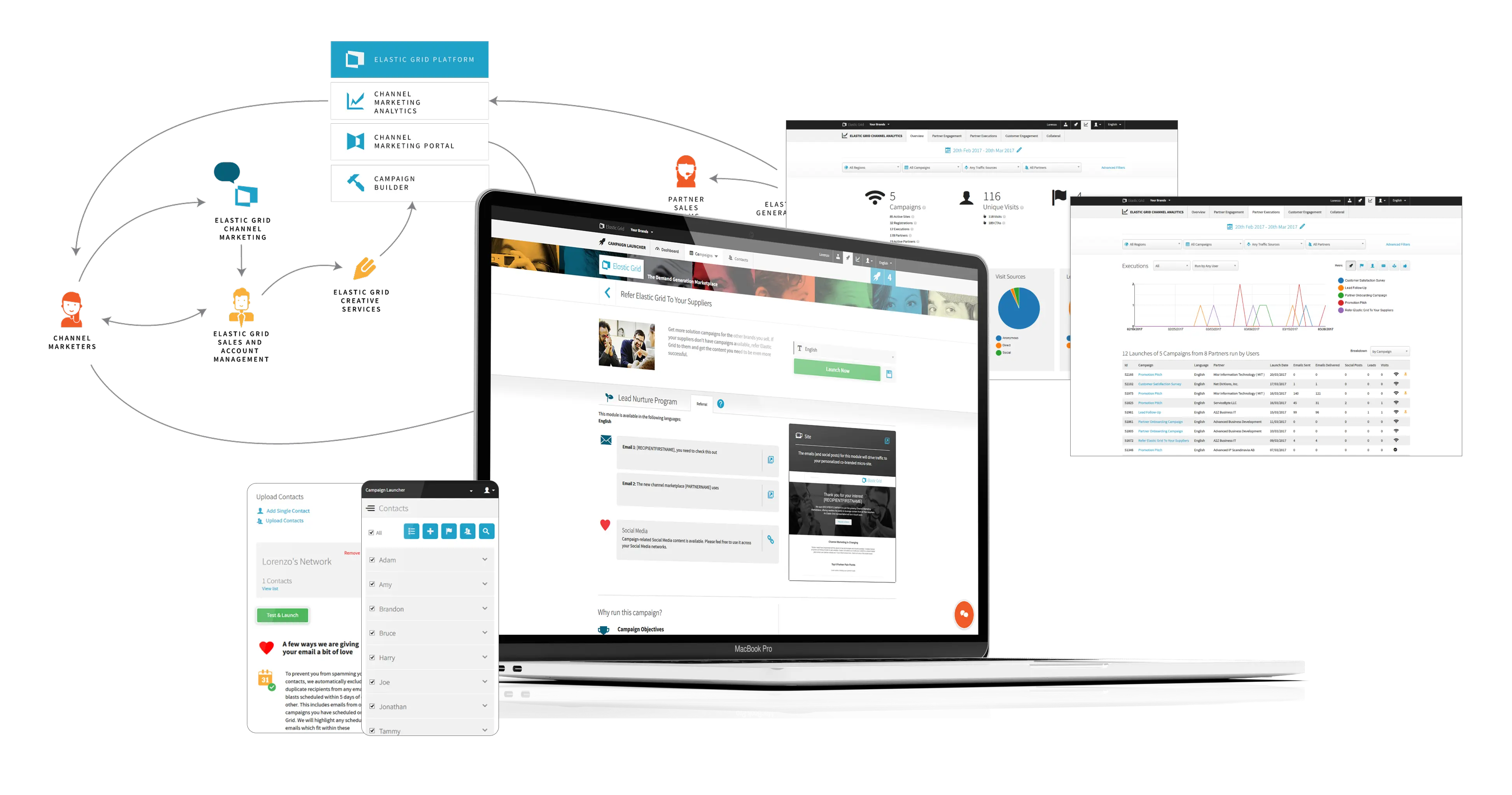
Designing the software for a new approach
Re-imaging Elastic Grid to facilitate the new direction required planning, design and development of the interface, but also its data structure, information architecture, and authentication and authorisation flows, including the support of third-party single-sign-on integrations.
The architecture
The platform was re-architected completely and split across five key applications:
- Portals: Each Vendor had a portal (or store front) to showcase their channel marketing assets.
- Campaign Launcher: The marketing automation tool which hosted campaigns, contact management and execution tools for co-branding sites and scheduling email and social-media campaigns.
- Analytics: Used by Partners to review campaign performance and by channel marketers to view aggregated channel performance for campaign activity as well as collateral use.
- Blueprints: The Elastic Grid content management tool for Vendors to create and edit campaign.
- Admin: Used by Elastic Grid staff to manage vendors, users and campaigns.
Information and user flows
The first layer of design was determining the new page flows across the application suite.
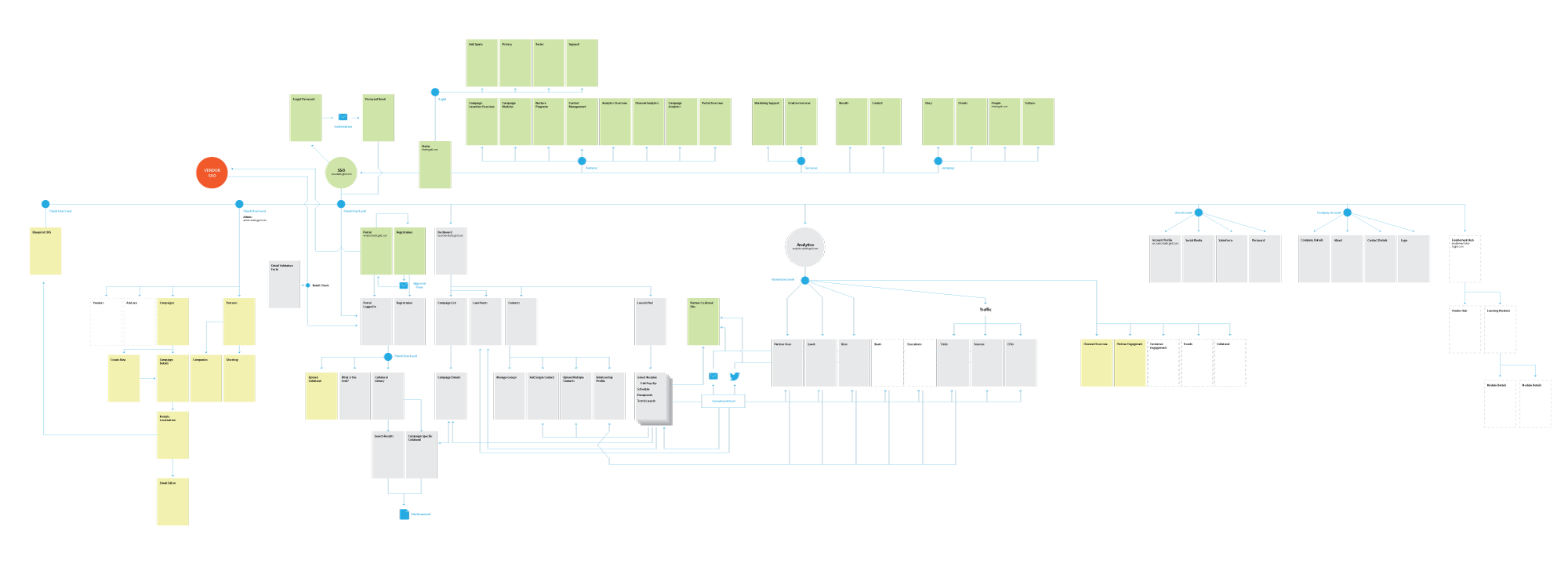
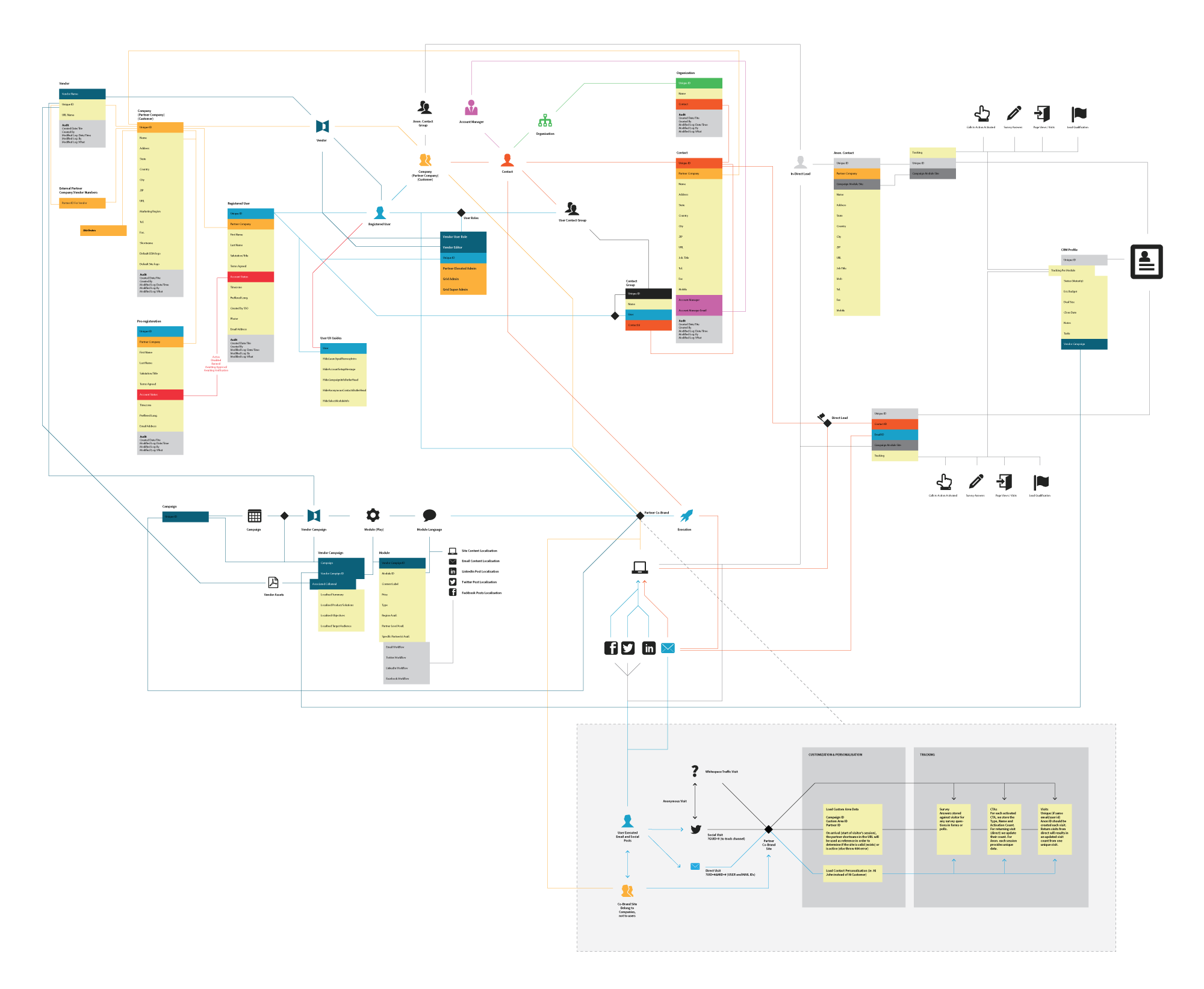
Data relationships
Key data associations across the platform suite were mapped out to determine the changes needed to be made in order to enable the many-to-many relationships approach of the new system. This included understanding and mapping the links between vendors, partners, campaigns, co-branded campaigns, campaign executions and contact relationship data.
Access flows
One of the more complex aspects of the Elastic Grid platform was assigning the various user roles, access levels for administration and permissible authentication and authorisation via third-party single-sign-on. The access pathway map demonstrates the flows and access to applications and resources for the various user roles.
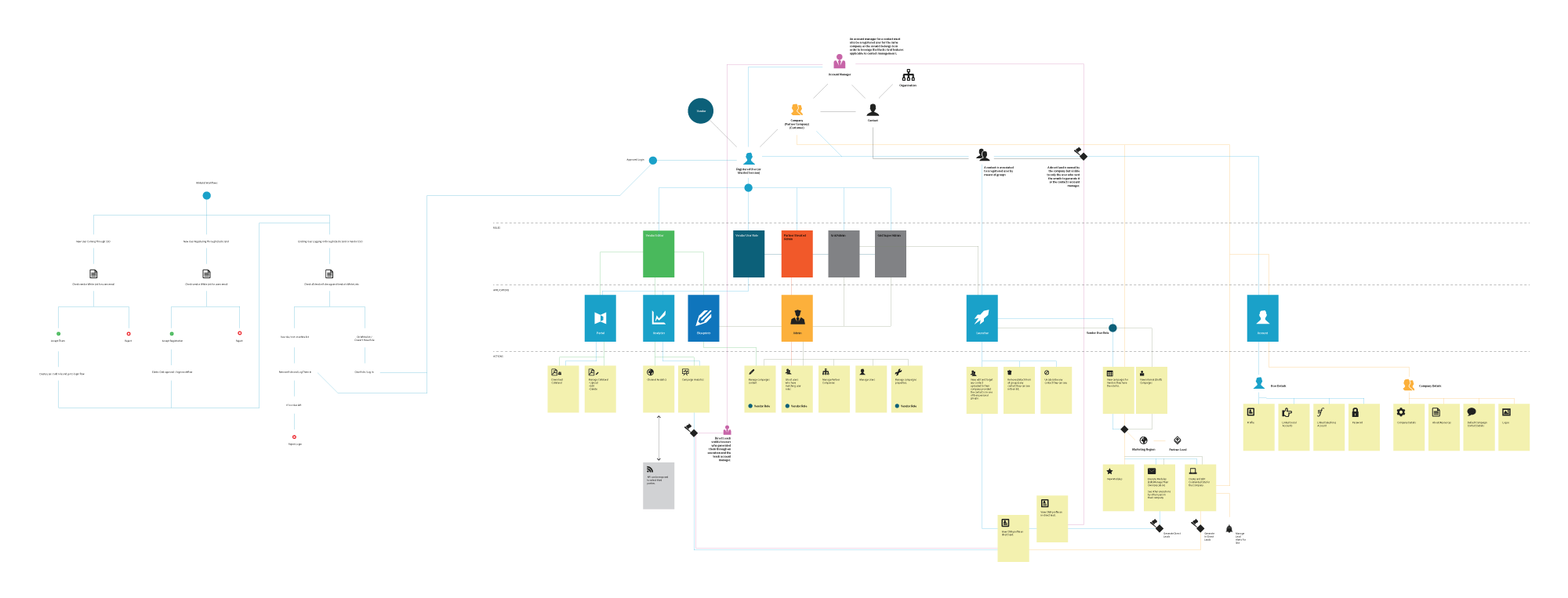
Repositioning and re-branding
It wasn't enough to simply re-build the software. Elastic Grid was part of a broader company repositioning. Therefore, the brand, style and tone which accompanied the customer experience required a new set of standards. Working with our marketing team and copywriters, I developed a new visual identity which set the standard for all documentation, campaigns and the platform's design system.
The new logo paid homage to the Elastic Digital legacy.
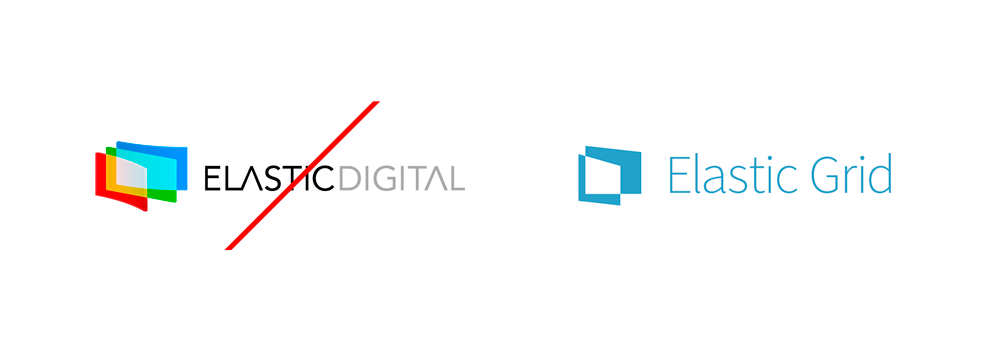
Standards Manual
Example pages from the Elastic Grid Standards Manual
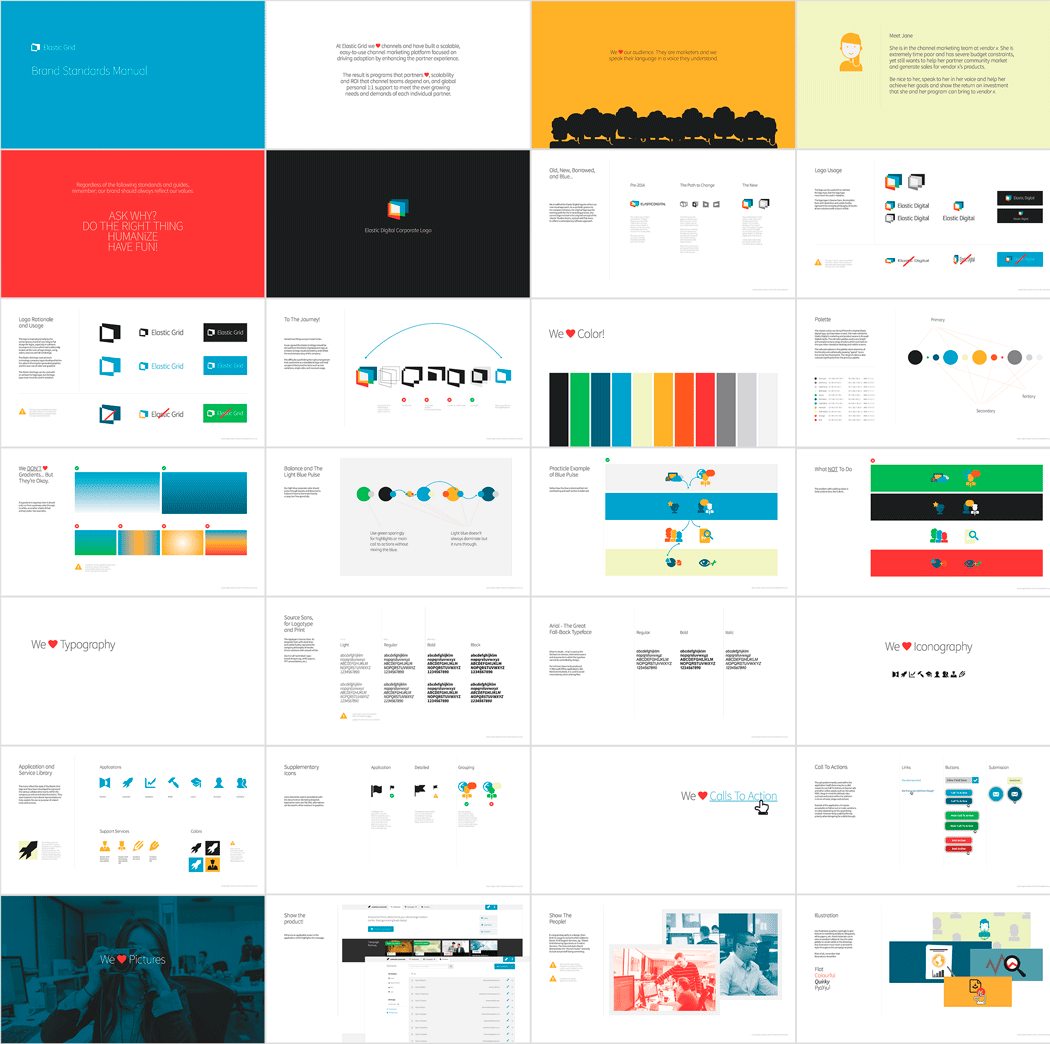
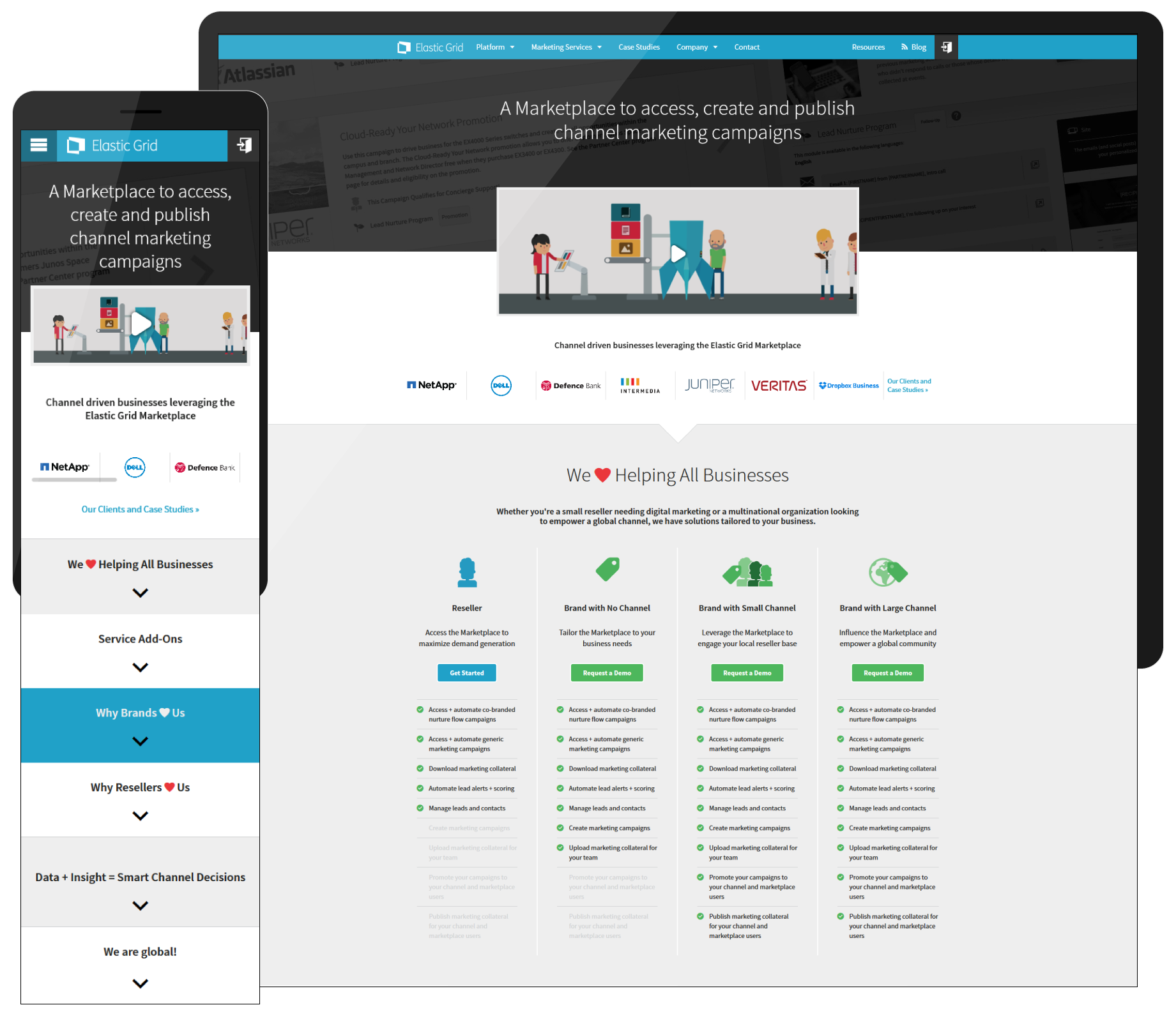
The website
The Elastic Grid website was an important lead generation mechanism. The content and layout was continually iterated to maximise goal conversion. Focus was placed on the platform's ease of use, flexibility and power across different user needs, and the results it delivered both Vendors and their Channel Partners. It encouraged sign-up as opposed to demo requests.
A user-first platform
The user experience of the platform was centred on a principle of "one thing at a time". The key usability concern was the complex nature of executing long-running lead-nurture campaigns, as well as the associated stress for time-poor and often non-marketer users from smaller re-sellers. In response, each screen on the platform focused on one key action and invited advanced options for those who needed them. The goal was achieving the ability to launch a co-branded campaign with ten clicks from start to finish if a partner chose to run with defaults.
Vendor Portal: Each vendor had a storefront to showcase marketing and education options to their partner community. Juniper Networks exampled here.
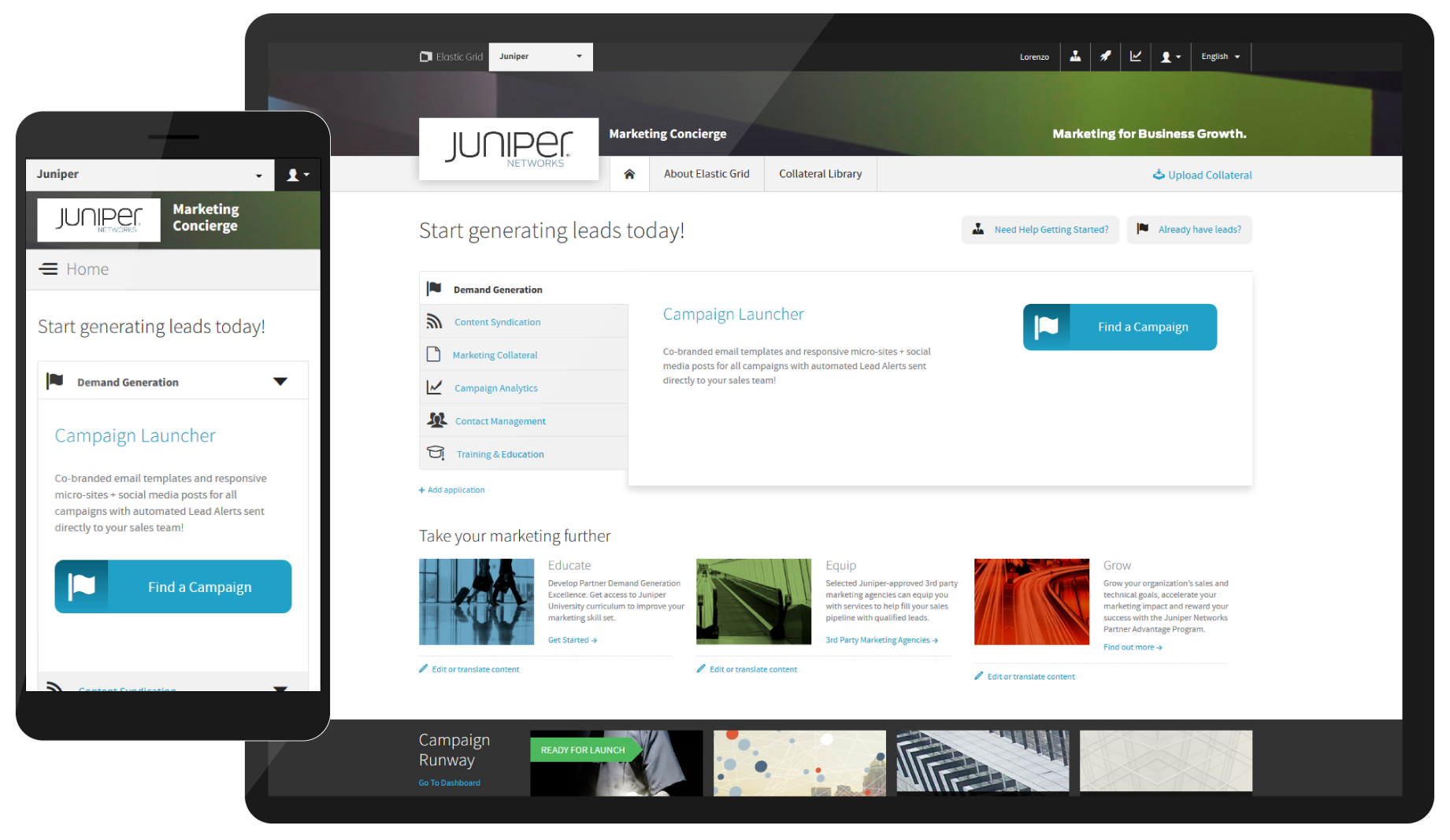
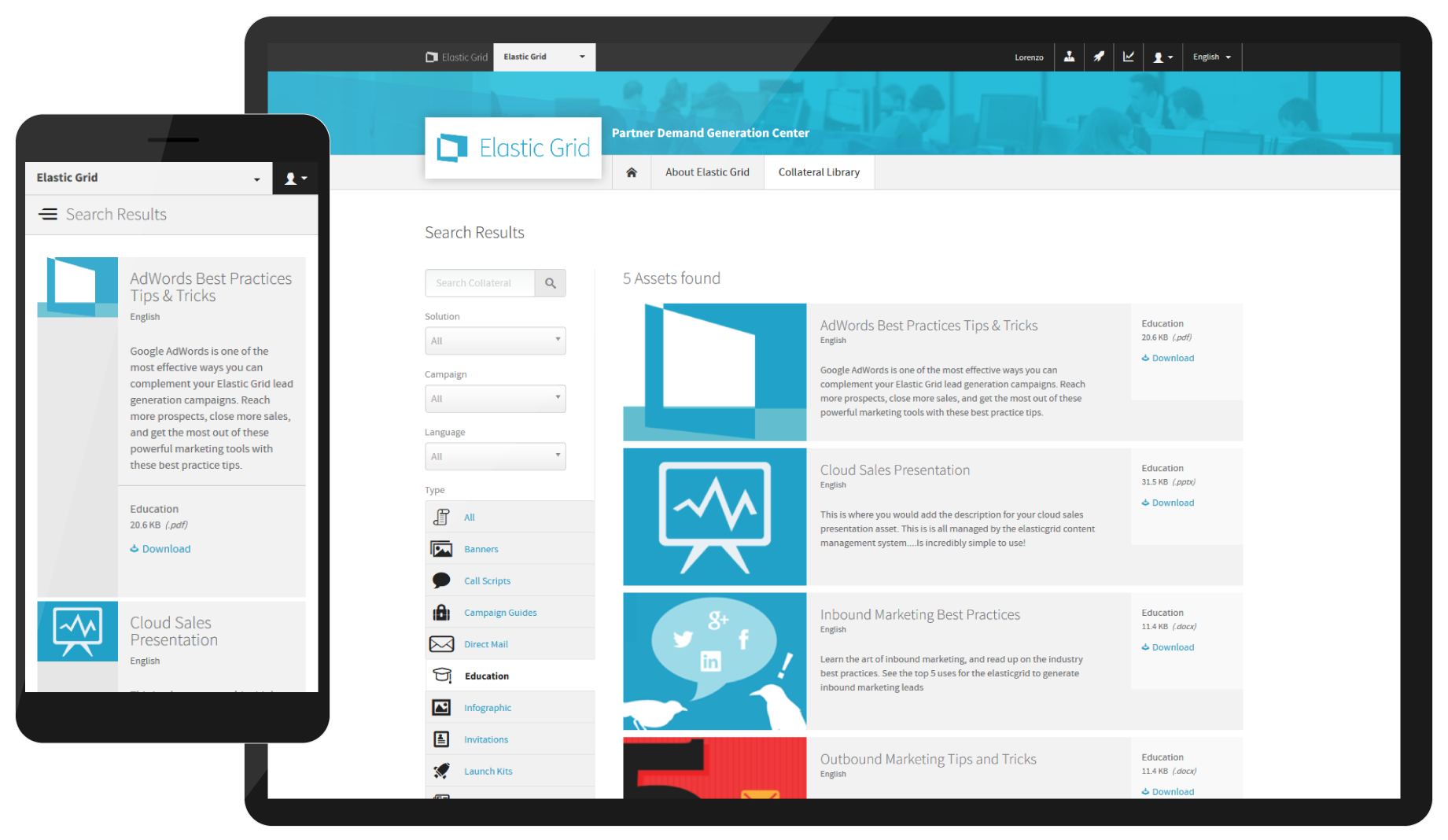
Collateral Library
Vendor Collateral Library. Elastic Grid's own exampled here.
Campaign Launcher Dashboard
The user's main hub from which they are prompted to run campaigns, manage contacts or analyse their reports.
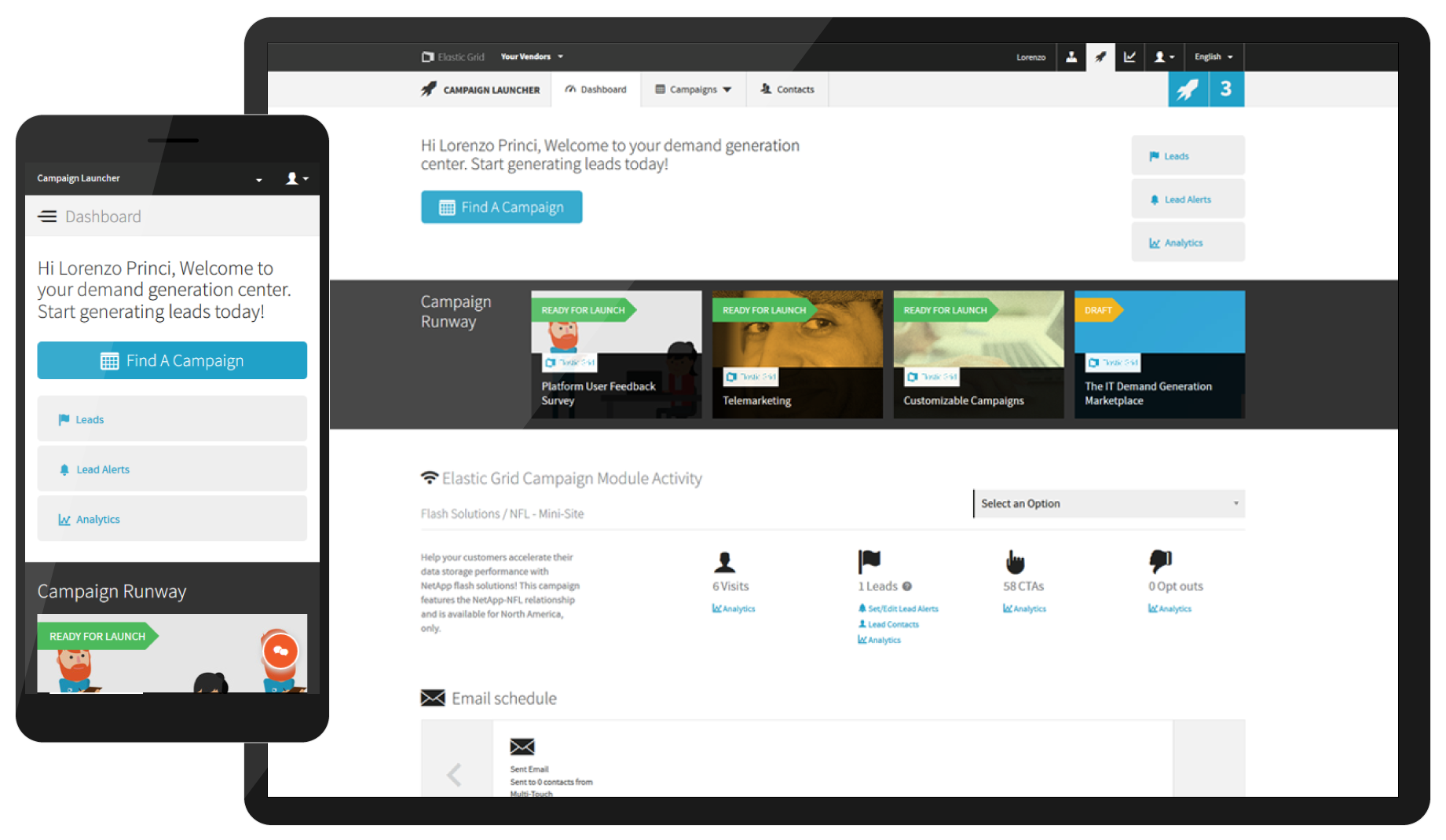
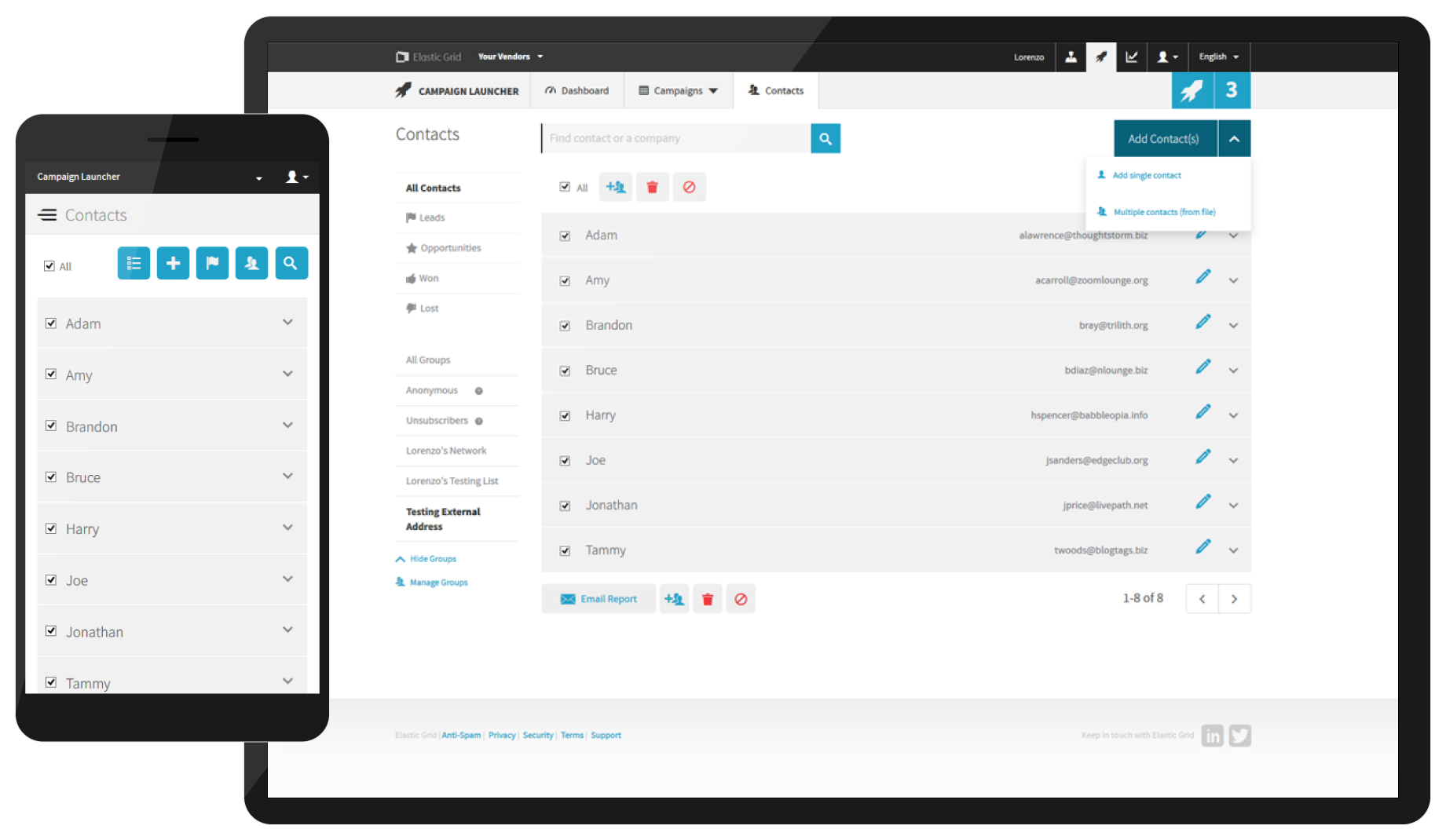
Contacts
Contact Management: A light CRM for contact lists to be organised and manage campaign leads.
Contact lead profile
A detail screen which included specific details about a customer's campaign engagement.
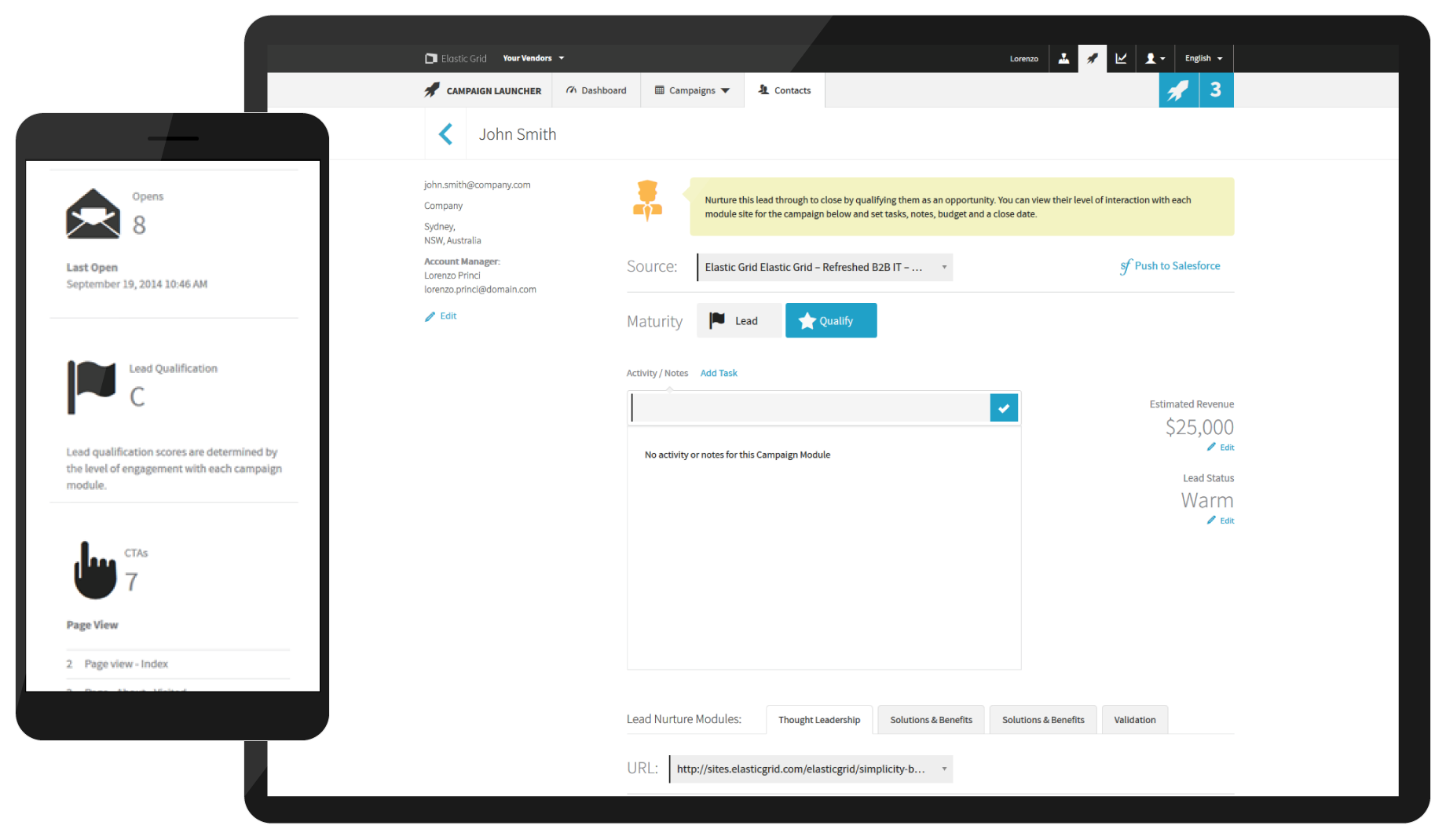
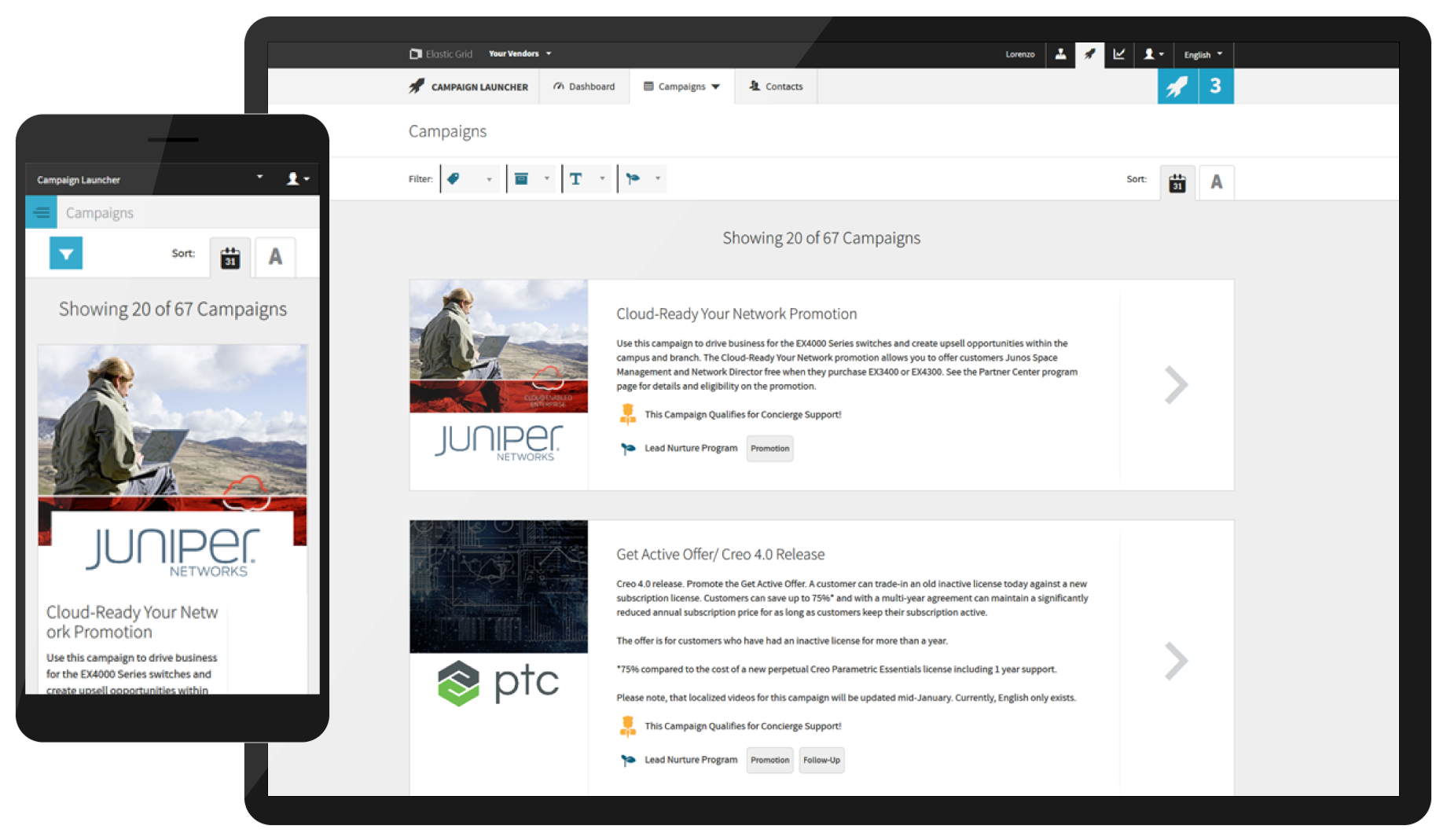
Campaigns
The Campaign List: And index which showed campaign availables from all Vendors a user had partnered with (and had regional access to).
Campaign Details Screen
Demonstrated the purpose of the campaign and allowed partners to preview it (in all languages available) as well as setup their own co-brand version and begin a campaign execution.
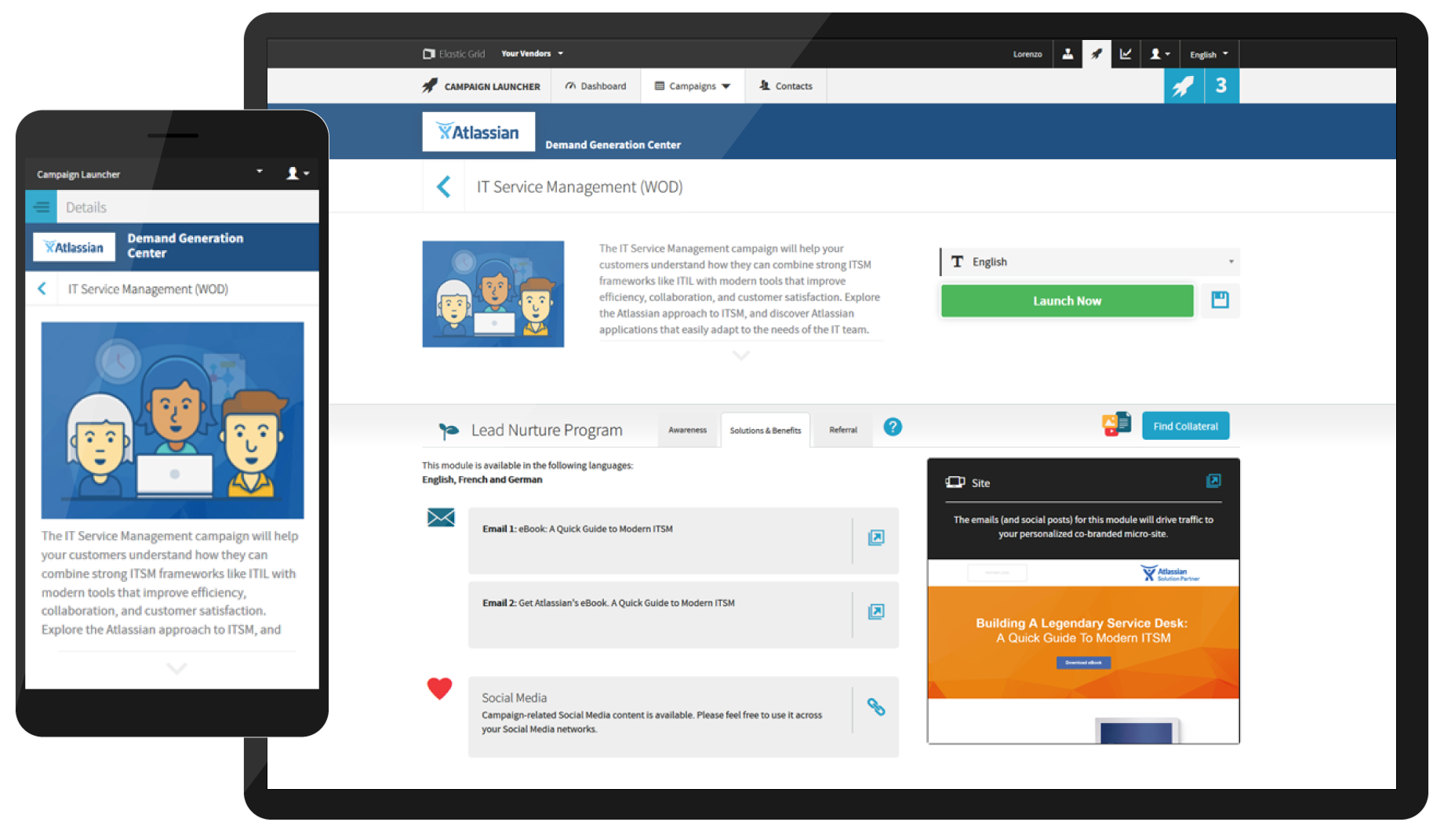
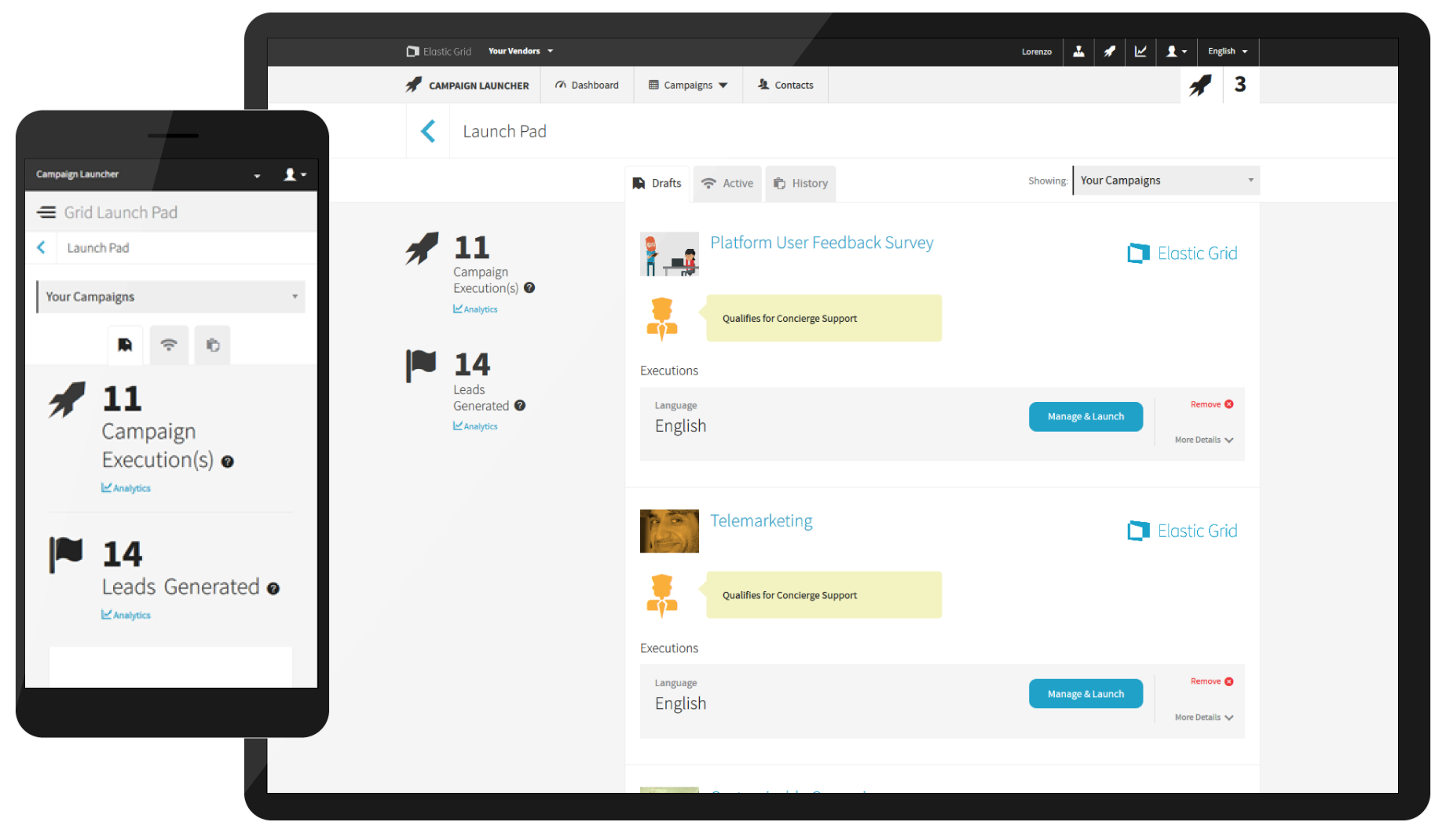
Campaigns Launch Pad
Aggregated all partner campaign executions.
Campaign Launch Scheduling
The complex multi-touch and cross channel campaign scheduling was simplified by showing users only as much as they needed at any given time. It then enabled them to dive into advanced functionality once the context has been set.
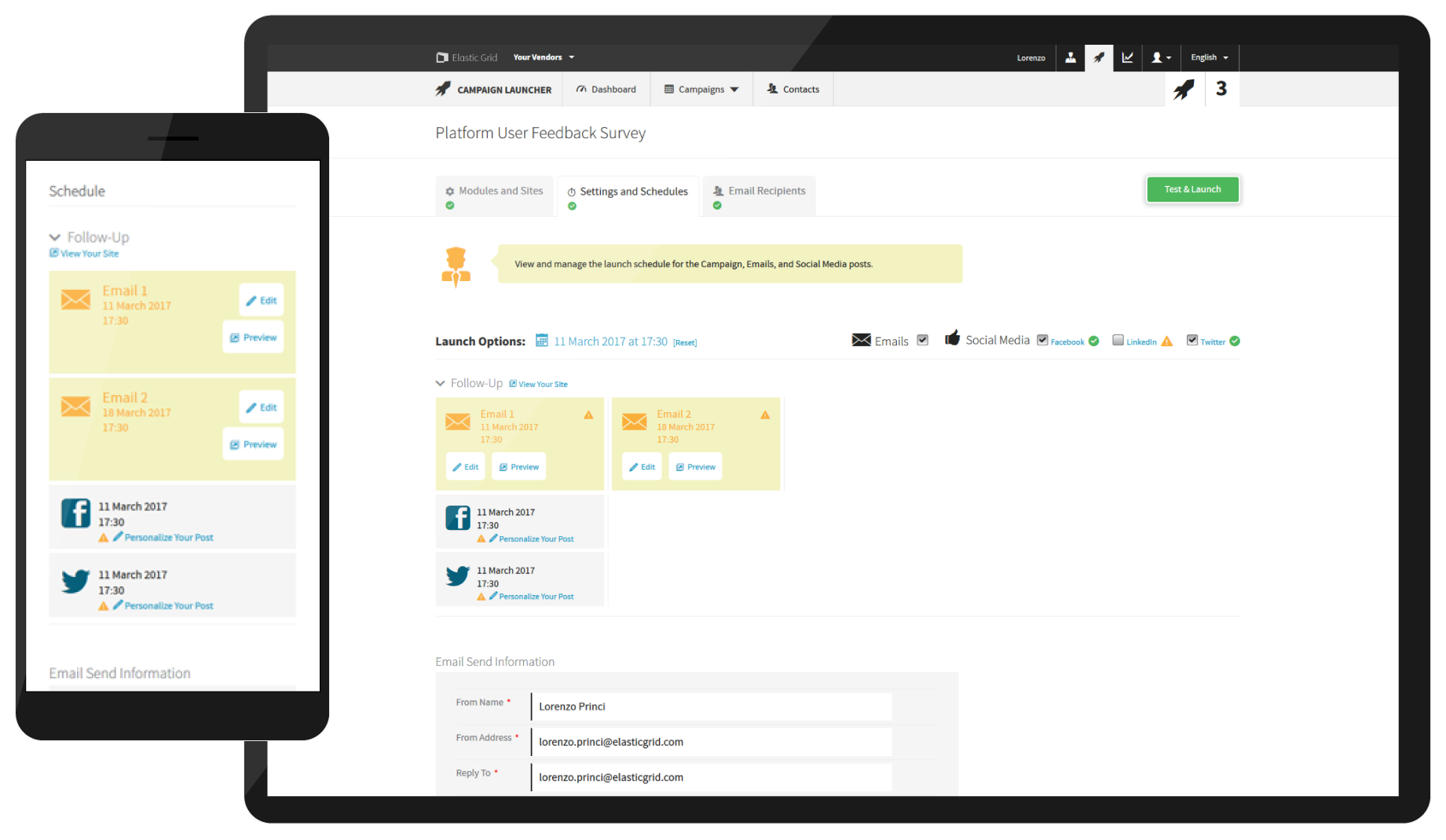
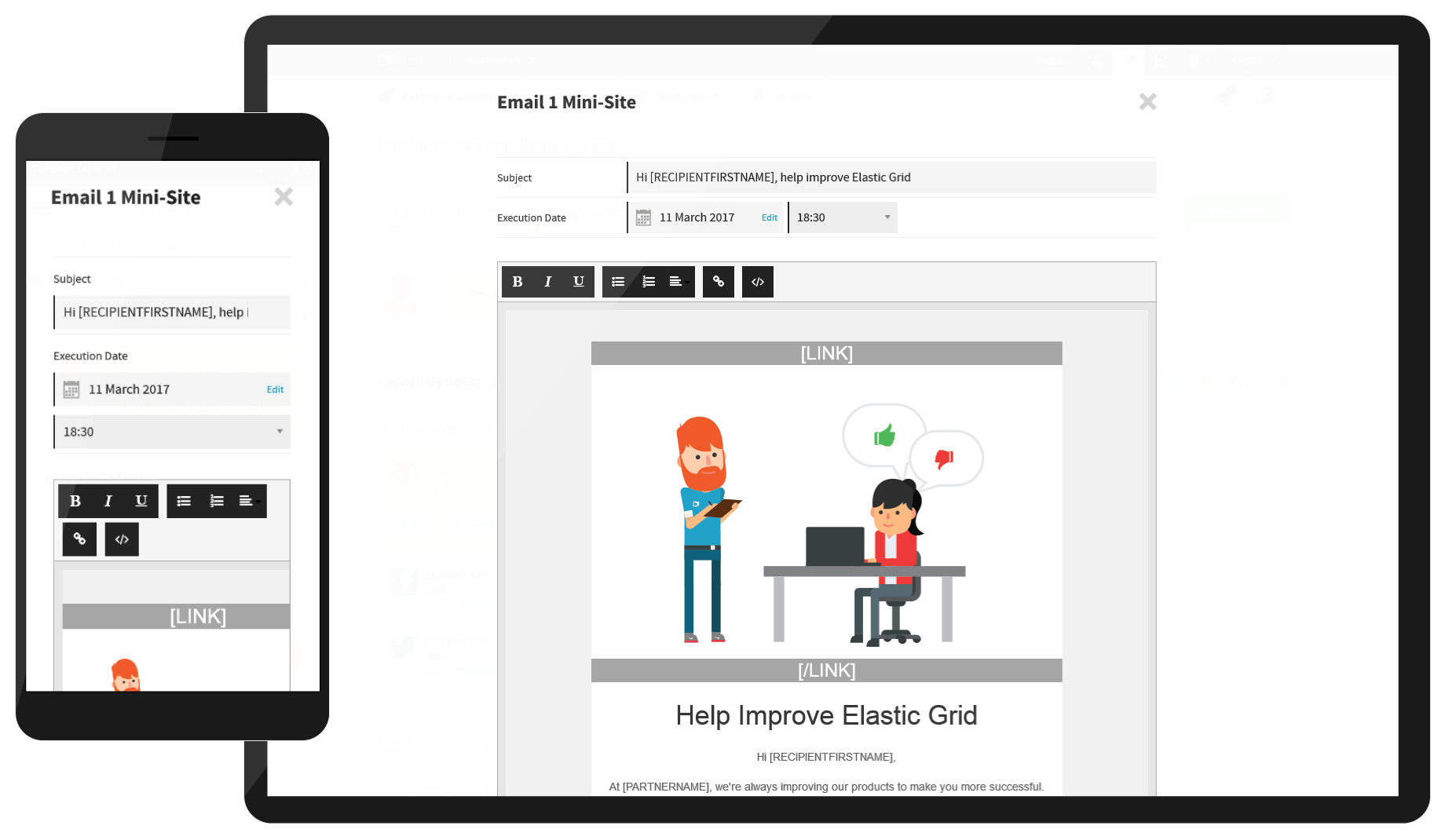
Co-branding
Campaign site co-branding, emails and social-posts could be editing in-line through modal windows.
Campaign Launch Contact Lists
could be managed as the campaign was being setup and the user was given an warning or information about the list.
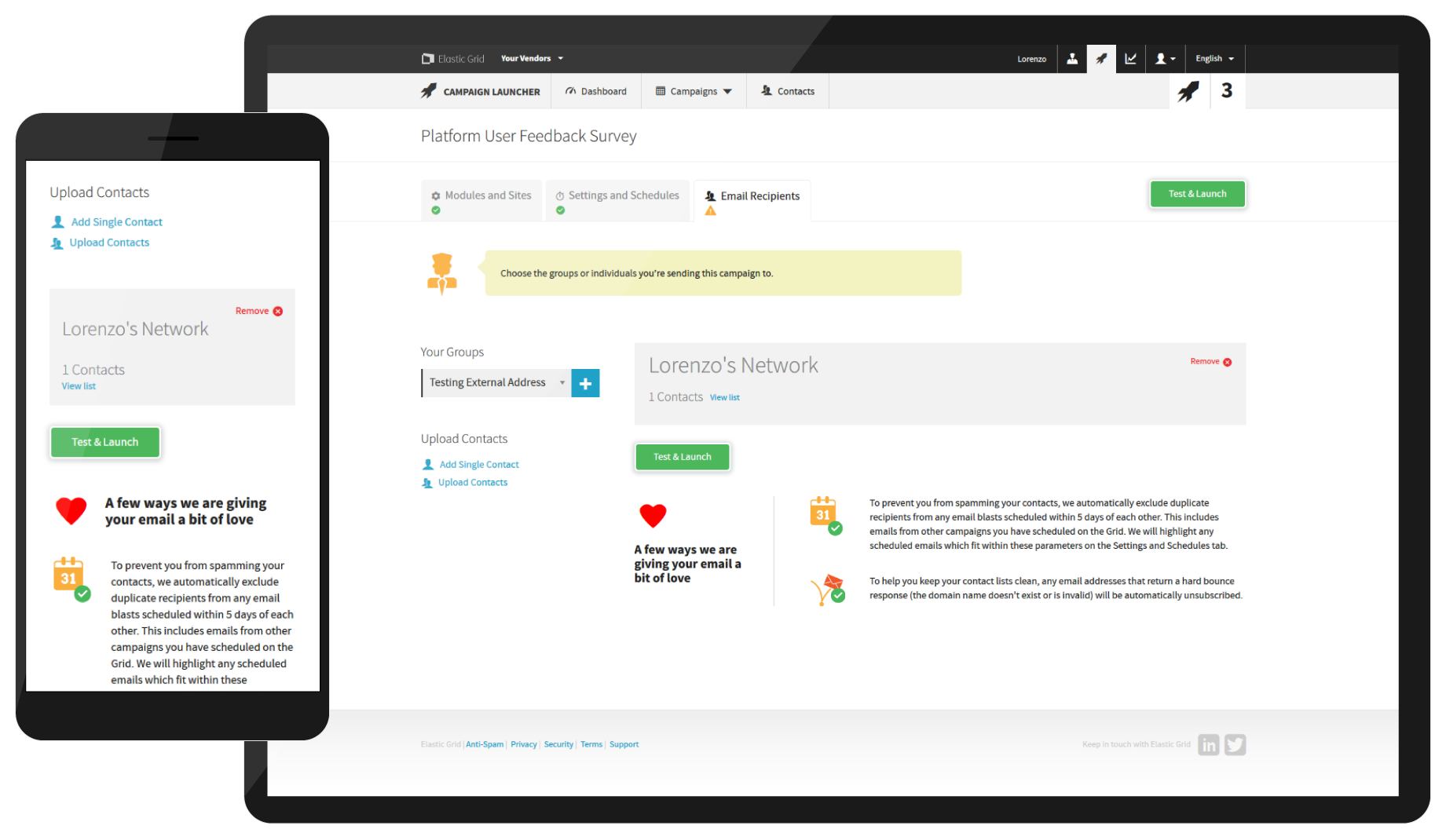
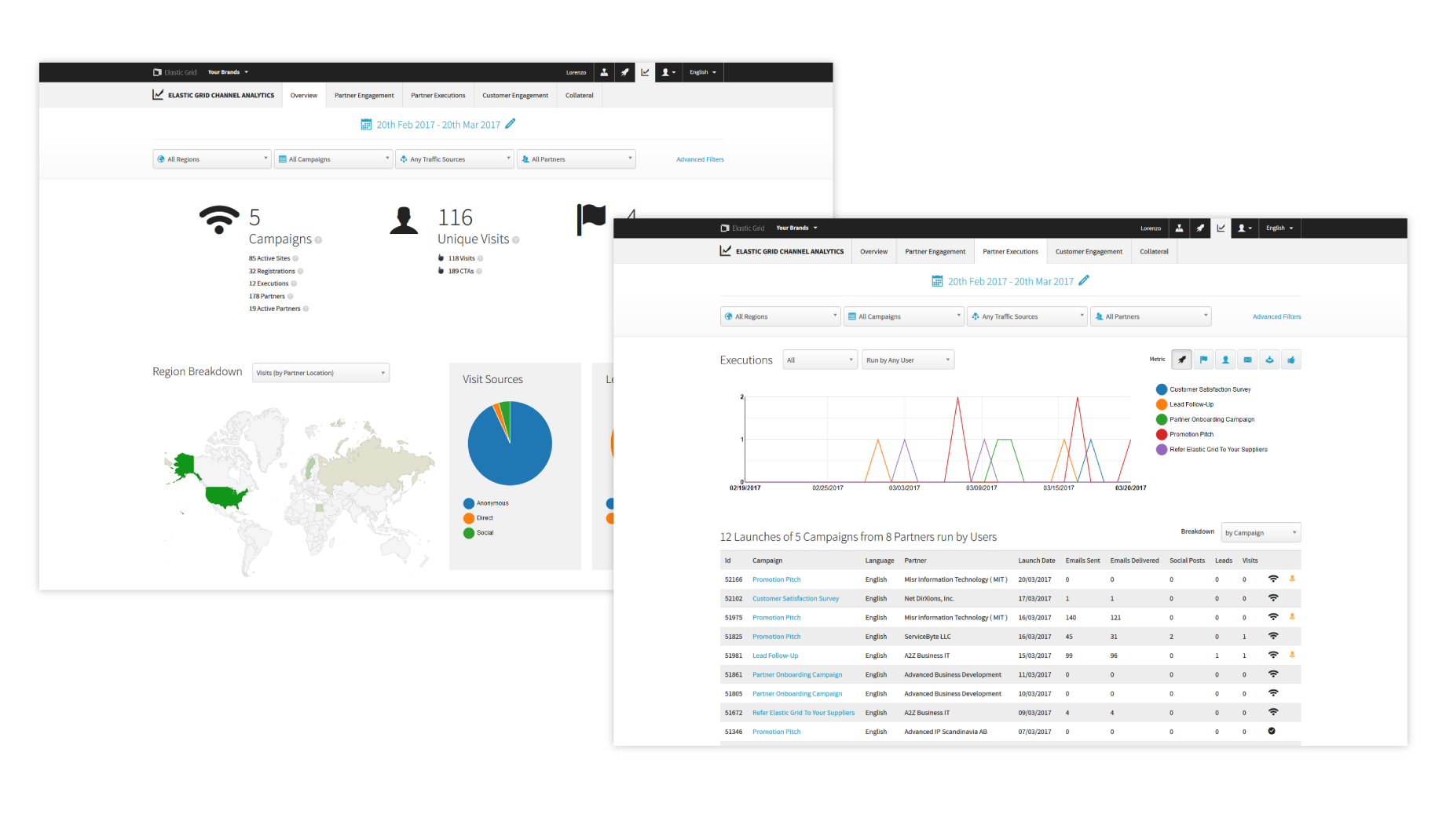
Vendor enablement features
Vendor level users were given more functionality to help manage their channel. This included the ability to build campaigns within the platform and see the overall performance of their campaigns at a channel level.
Channel Analytics: Included simple, data visualisation and powerful drill down to help channel marketers to understand how their campaigns were performing globally.
Blueprints
A campaign site builder application with inline editing which made generating Elastic Grid intergrated co-brandable campaigns for partners.
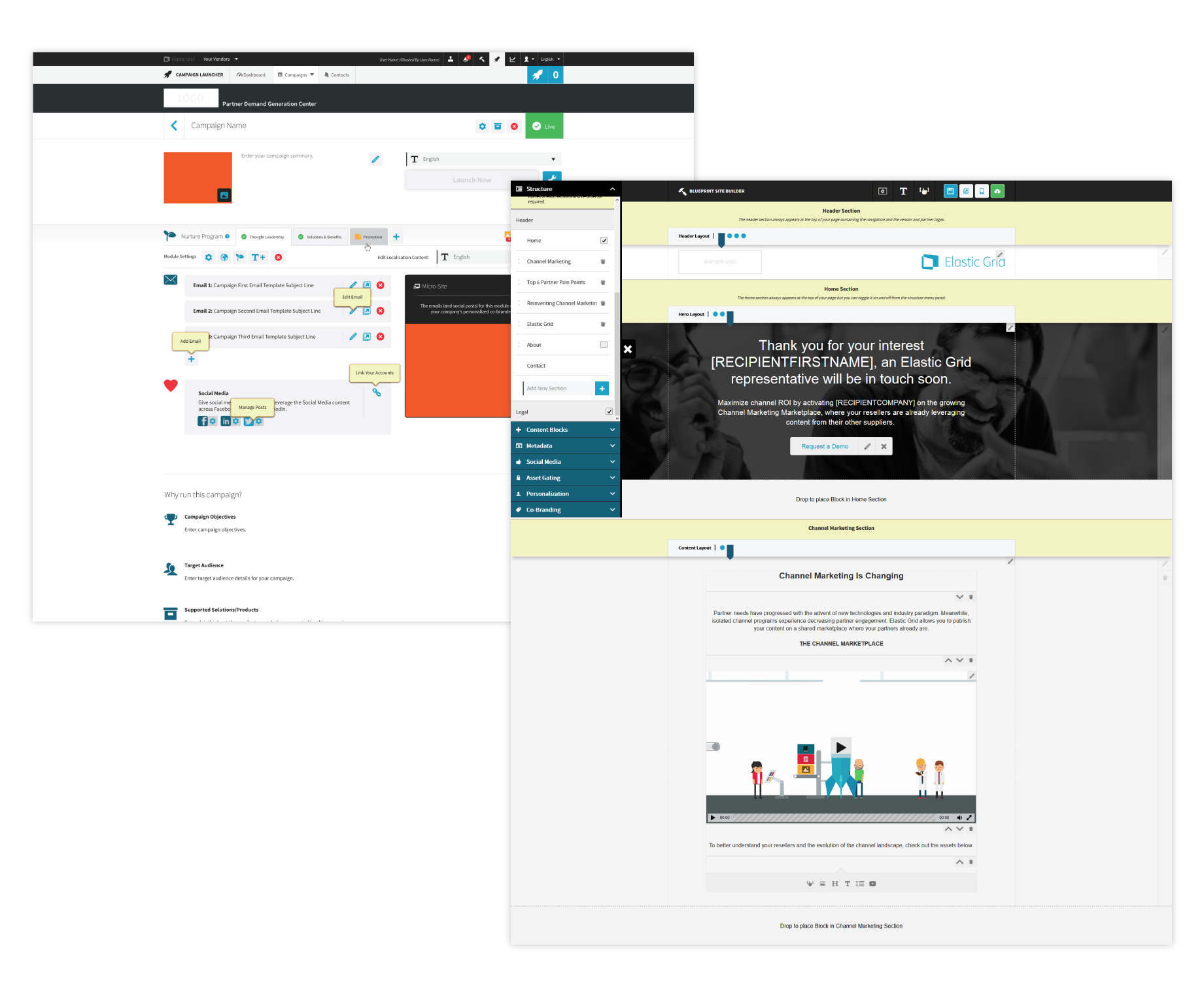
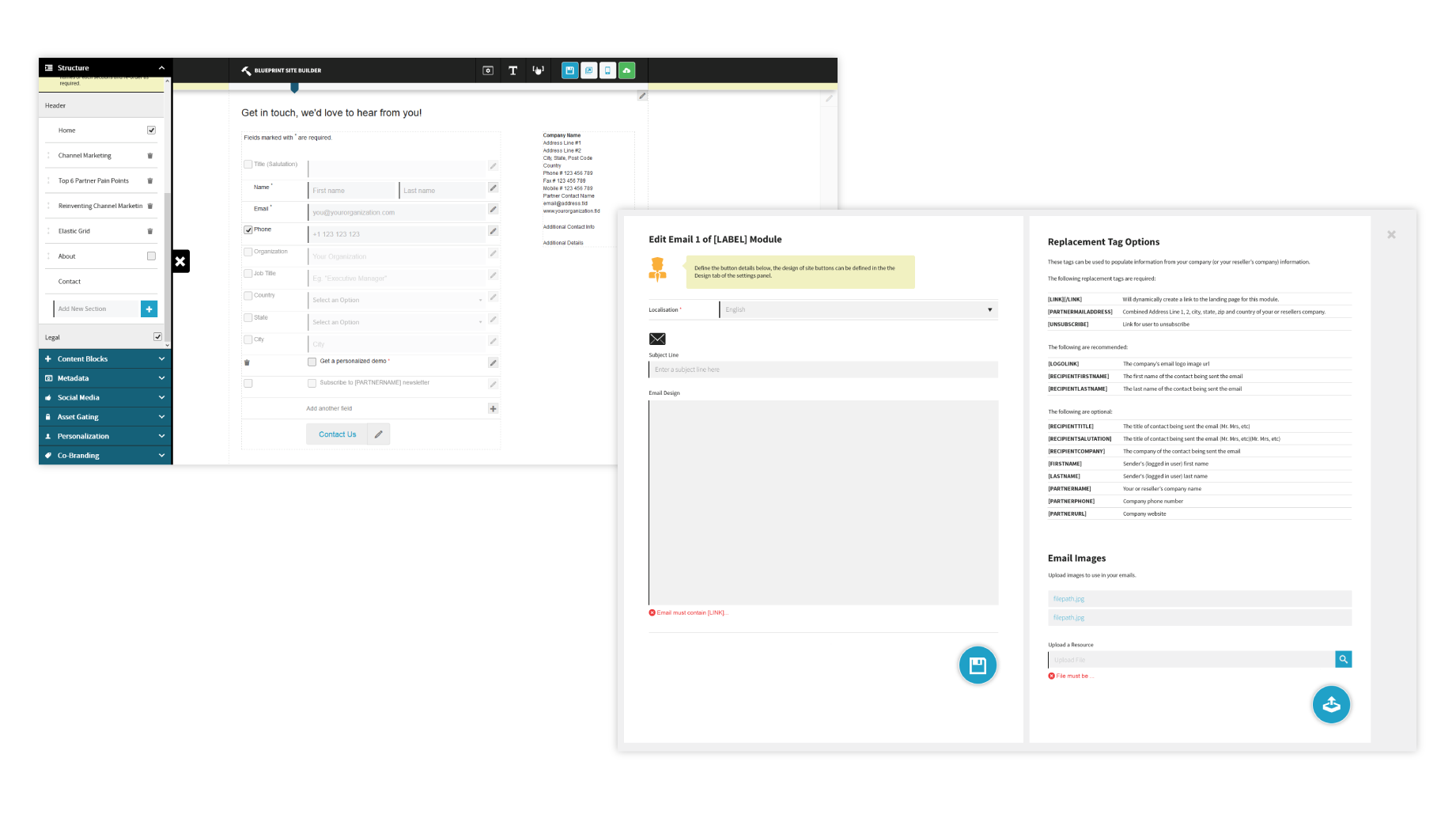
Blueprints
Blueprints: A campaign site builder application with inline editing which made generating Elastic Grid intergrated co-brandable campaigns for partners.